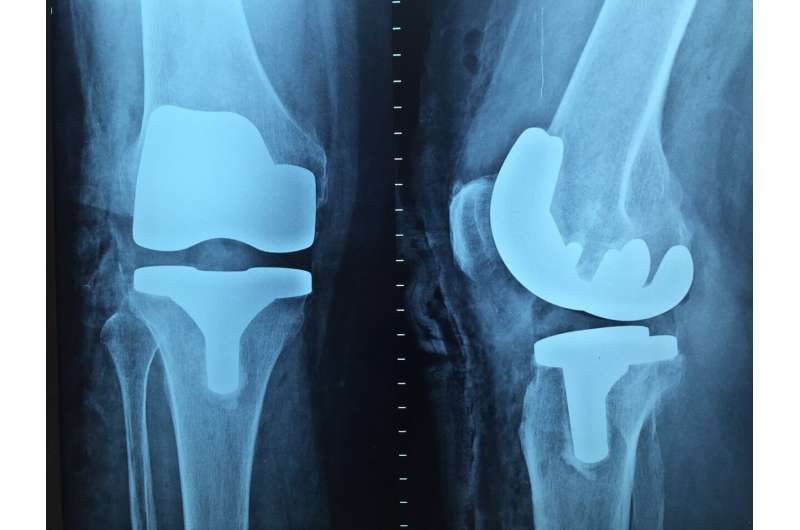Higher prices don't imply better care for patients undergoing joint replacement

The prices that insurers negotiate for total joint replacement (TJR) procedures vary widely according to type of insurer and aren't associated with conventional measures of health care quality, according to a study in Clinical Orthopaedics and Related Research (CORR).
TJR is the most common in-hospital surgery performed for U.S. patients older than 65 years. It's predicted that the number of these procedures—most commonly knee or hip replacement—will continue to increase year after year, making them a key driver of rising health care costs. In general, prices for the procedures are negotiated by insurance companies and the federal government rather than being set by individual surgeons or hospitals.
Robin N. Kamal, MD, MBA, of the VOICES Health Policy Research Center in the Department of Orthopedic Surgery at Stanford University, and colleagues investigated the prices that insurers negotiated for TJR and whether the prices were associated with quality of care. They analyzed publicly available data from 18 hospitals in a single large California health system.
For each hospital, they classified the negotiated prices for TJR by payer type: commercial in-network, commercial out-of-network, Medicare Advantage (plans in which commercial insurers contract to provide Medicare benefits), Medicaid, or discounted cash pay.
"We found that the differences in negotiated prices across the five surveyed payer types for the same [TJR] procedures varied by nearly $60,000," the researchers report.
Private insurers paid most, Medicaid paid least, regardless of quality measures
The lowest negotiated prices were associated with Medicare Advantage and Medicaid insurance plans, and the highest prices were associated with out-of-network care covered by commercial insurance plans. When all types of joint replacement procedures were considered, the average price was:
- Commercial out-of-network—$78,800
- Commercial in-network—$63,900
- Discounted cash—$52,200
- Medicare Advantage—$20,400
- Medicaid managed care—$20,300
There was no correlation between the average negotiated price and any of four measures of the quality of care: the TJR complication rate, the need for hospital readmission after surgery, patients' ratings of their care, and overall hospital performance score. Neither was there any association between price and these quality measures when all payer types were aggregated into a single average negotiated price by hospital.
Efforts to improve the value of TJR care depend on informing patients
Dr. Kamal and his colleagues note that patients need access to price and quality information that's linked together. They propose that surgeons determine appropriate measures of TJR quality, combine them with price information, and present the results in decision aids—tools such as brochures and charts that help patients make more informed choices about surgery.
"Other strategies for reporting care quality and price include surgeon scorecards and institutional value dashboards [online reports at hospital websites], which have been piloted in orthopedic surgery with promising results," the authors say. "Hospitals should combine them with price information and present the results transparently to help patients make more informed choices about surgery."
More information: The Price-Quality Mismatch: Are Negotiated Prices for Total Joint Arthroplasty Associated With Hospital Quality in a Large California Health System? Clinical Orthopaedics and Related Research. DOI: 10.1097/CORR.0000000000002489




















